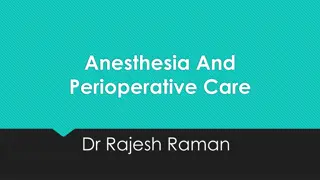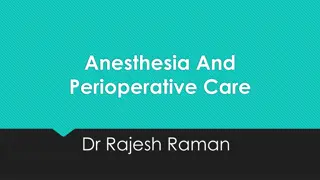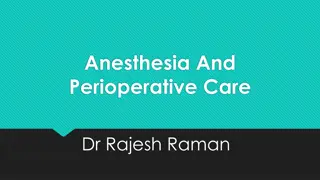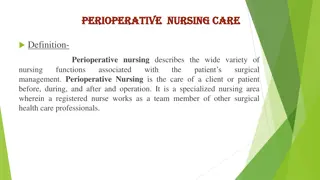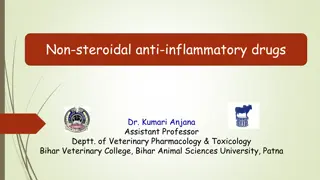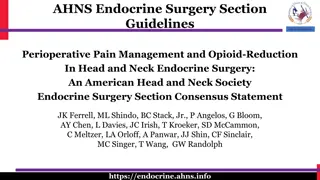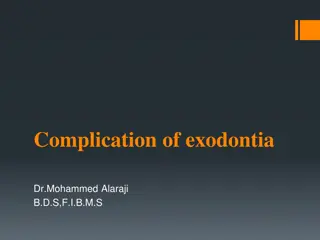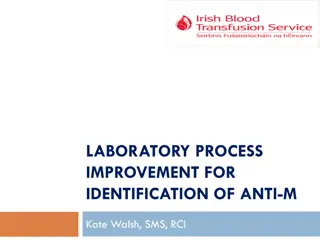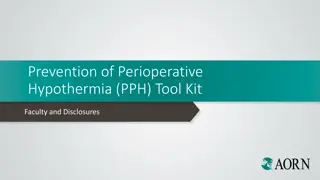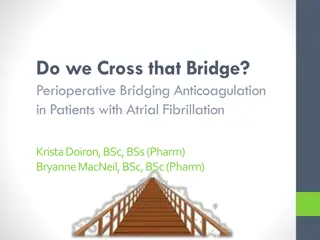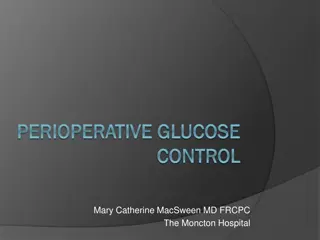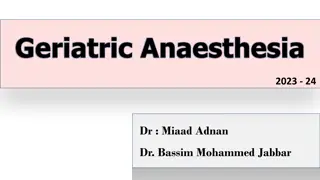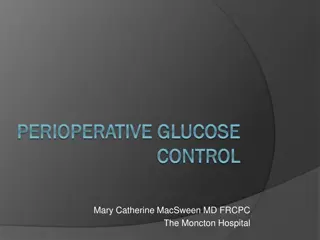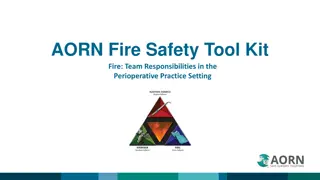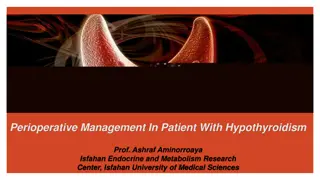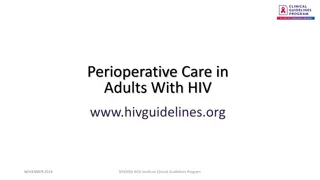
Perioperative Management of Hypertension - Case Study
This case study focuses on the perioperative management of hypertension, with a scenario involving Mr. Smith, a 68-year-old man scheduled for hip replacement surgery. The content covers the diagnosis and management of hypertension, the importance of optimizing pre-existing health conditions, and the use of ASA scoring system in practice. Various stages of hypertension, anti-hypertensive medications, perioperative blood pressure changes, and post-operative care are discussed in detail.
Uploaded on | 1 Views
Download Presentation

Please find below an Image/Link to download the presentation.
The content on the website is provided AS IS for your information and personal use only. It may not be sold, licensed, or shared on other websites without obtaining consent from the author. If you encounter any issues during the download, it is possible that the publisher has removed the file from their server.
You are allowed to download the files provided on this website for personal or commercial use, subject to the condition that they are used lawfully. All files are the property of their respective owners.
The content on the website is provided AS IS for your information and personal use only. It may not be sold, licensed, or shared on other websites without obtaining consent from the author.
E N D
Presentation Transcript
Hypertension: Perioperative management and pharmacology of anti- hypertensives Tutor-led Case Based Learning Activity
Learning outcomes To recall the diagnosis and management of hypertension. To understand the ASA scoring system and use it in practice. To understand the importance for optimizing pre-existing health conditions and modifiable risk factors before elective surgery using an example. Hypertension: Perioperative management and pharmacology of anti-hypertensives
Plan Ongoing Case Study 1: Stages of Hypertension 2: ASA Scores 3: Anti-hypertensive medications 4: Perioperative Blood pressure changes 5: Post-operative care Case Summary Hypertension: Perioperative management and pharmacology of anti-hypertensives
Case Study: Mr. Smith is a 68-year-old gentleman who is scheduled for a right total hip replacement in 6 months. He attends the pre-operative assessment clinic with the anaesthetist to evaluate his fitness for surgery. During the clinic assessment you notice that his blood pressure is persistently high (190/110). As part of your assessment, you identify all modifiable risk factors that can be addressed to minimize complications and refer him to his GP for investigation. Hypertension: Perioperative management and pharmacology of anti-hypertensives
1: Stages of Hypertension Systolic/Diastolic: Clinic Systolic/Diastolic: Ambulatory Stage 1 Stage 2 Stage 3 Hypertension: Perioperative management and pharmacology of anti-hypertensives
1: Stages of Hypertension Systolic/Diastolic: Clinic Systolic/Diastolic: Ambulatory Stage 1 140/90 135/85 Stage 2 160/100 150/95 Stage 3 180/120 Hypertension: Perioperative management and pharmacology of anti-hypertensives
2: ASA scores To assess Mr. Smith s fitness to undergo anaesthesia at the time of his pre- operative assessment, he would have been assigned an ASA score. Which ASA score would Mr. Smith have been assigned at the time of his pre Which ASA score would Mr. Smith have been assigned at the time of his pre- - operative assessment? operative assessment? A: ASA 1 B: ASA 2 C: ASA 3 D: ASA 4 E: ASA 5 Hypertension: Perioperative management and pharmacology of anti-hypertensives
2: ASA scores To assess Mr. Smith s fitness to undergo anaesthesia at the time of his pre- operative assessment, he would have been assigned an ASA score. Which ASA score would Mr. Smith have been assigned at the time of his pre Which ASA score would Mr. Smith have been assigned at the time of his pre- - operative assessment? operative assessment? A: ASA 1 B: ASA 2 C: ASA 3 C: ASA 3 D: ASA 4 E: ASA 5 Hypertension: Perioperative management and pharmacology of anti-hypertensives
2: ASA score review Mr. Smith having uncontrolled hypertension means he has an ASA classification of III. Hypertension: Perioperative management and pharmacology of anti-hypertensives
Case Study Continued: After a review from his GP, the patient was commenced on Ramipril and reports that his Blood pressure had improved and is 145/89. Discuss Discuss what effect does this have on Mr. Smiths perioperative risk? what effect does this have on Mr. Smiths perioperative risk? Hypertension: Perioperative management and pharmacology of anti-hypertensives
3: Anti-hypertensive medications What class of anti What class of anti- -hypertensive medication is Ramipril? hypertensive medication is Ramipril? A: Calcium Channel Blocker B: Angiotensin converting enzyme inhibitor C: Thiazide like diuretic D: Angiotensin Receptor Blocker E: Beta-blocker Hypertension: Perioperative management and pharmacology of anti-hypertensives
3: Anti-hypertensive medications What class of anti What class of anti- -hypertensive medication is Ramipril? hypertensive medication is Ramipril? A: Calcium Channel Blocker B: Angiotensin converting enzyme inhibitor B: Angiotensin converting enzyme inhibitor C: Thiazide like diuretic D: Angiotensin Receptor Blocker E: Beta-blocker Hypertension: Perioperative management and pharmacology of anti-hypertensives
3: Anti-hypertensive medications Hypertension: Perioperative management and pharmacology of anti-hypertensives
Case Study Continued: Mr. Smith had arrived at the department early in the morning and consented to surgery. Baseline observations were performed, and his blood pressure was 139/82 139/82. He has been collected and brought to the anesthetic room. He has been induced with Propofol and his induction is maintained on Total Intravenous Anaesthesia (TIVA). Hypertension: Perioperative management and pharmacology of anti-hypertensives
4: Perioperative Blood Pressure Changes A blood pressure cuff is applied to Mr. Smiths arm and his blood pressure is A blood pressure cuff is applied to Mr. Smiths arm and his blood pressure is monitored throughout surgery. How often is a blood pressure reading monitored throughout surgery. How often is a blood pressure reading obtained during surgery? obtained during surgery? A: At the start and at the end B: Every 1 minute C: Every 2 minutes D: Every 5 minutes E: Every 10 minutes Hypertension: Perioperative management and pharmacology of anti-hypertensives
4: Perioperative Blood Pressure Changes A blood pressure cuff is applied to Mr. Smiths arm and his blood pressure is A blood pressure cuff is applied to Mr. Smiths arm and his blood pressure is monitored throughout surgery. How often is a blood pressure reading monitored throughout surgery. How often is a blood pressure reading obtained during surgery? obtained during surgery? A: At the start and at the end B: Every 1 minute C: Every 2 minutes D: Every 5 minutes D: Every 5 minutes E: Every 10 minutes Hypertension: Perioperative management and pharmacology of anti-hypertensives
4: Perioperative Blood Pressure Changes Mr. Smith s vitals are monitored throughout the surgery. It is noted that his BP throughout surgery is averaging around 120/75. Knowing that his admission blood pressure was 139/82, should we be Knowing that his admission blood pressure was 139/82, should we be concerned about his sudden drop to 120/75? concerned about his sudden drop to 120/75? Discuss Discuss Hypertension: Perioperative management and pharmacology of anti-hypertensives
4: Perioperative Blood Pressure Changes Discuss what are the two main reasons for the alteration in blood pressure Discuss what are the two main reasons for the alteration in blood pressure during surgery? during surgery? Hypertension: Perioperative management and pharmacology of anti-hypertensives
4: Perioperative Blood Pressure Changes What constitutes the blood pressure? What constitutes the blood pressure? Hypertension: Perioperative management and pharmacology of anti-hypertensives
4: Perioperative Blood Pressure Changes What constitutes the blood pressure? What constitutes the blood pressure? BP = CO x SVR CO = SV X HR Hypertension: Perioperative management and pharmacology of anti-hypertensives
4: Blood Pressure Changes During Surgery Midway through the surgery there is a drop in his blood pressure going from 120/75 to 90/60. The surgeons report there has not been a great deal of blood loss. Discuss Discuss what can be done to restore the blood pressure? what can be done to restore the blood pressure? Hypertension: Perioperative management and pharmacology of anti-hypertensives
5: Post-Operative care Mr. Smith was admitted to the recovery room then to the ward for post- operative care. Discuss Discuss how often should Mr. Smiths vitals be monitored post operatively how often should Mr. Smiths vitals be monitored post operatively (including Blood Pressure)? (including Blood Pressure)? Hypertension: Perioperative management and pharmacology of anti-hypertensives
Case Summary: Discuss Discuss why it was important to treat the patient s uncontrolled why it was important to treat the patient s uncontrolled hypertension? hypertension? Hypertension: Perioperative management and pharmacology of anti-hypertensives
Case Summary: Discuss Discuss why it was important to treat the patient s uncontrolled why it was important to treat the patient s uncontrolled hypertension? hypertension? General anaesthetic medications can cause: General anaesthetic medications can cause: Cardiac depressant effects Cardiac depressant effects which reduce systemic vascular resistance which reduce systemic vascular resistance Decrease baroreflex response Decrease baroreflex response which can lead to large swings in blood which can lead to large swings in blood pressure pressure Hypertension: Perioperative management and pharmacology of anti-hypertensives

